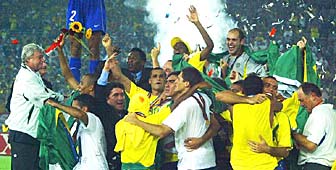Brazil win World Cup

After a month of football fever, the World Cup has drawn to a close with Brazil claiming their fifth World Cup title after beating Germany 2-0.
In a match that contrasted two greatly differing football styles – German consistency against Brazilian flair, the South American team proved the stronger of the two.
Brazilian striker Ronaldo scored both of the goals in the 67th and 79th minute blasting the ball past the German goalie and captain Oliver Kahn in the Yokohama stadium, outside the Japanese capital, Tokyo.
Ronaldo’s performance brought his goal tally to eight in seven World Cup matches.
Even though the Swiss national team failed to qualify for the international tournament, millions of people all over the country were glued to giant public screens and television sets during the final.
With their enthusiasm unaffected by their country’s failure to qualify for the tournament, football fans are now setting their sights on the 2006 World Cup in Germany.
But Switzerland has not been totally absent from the competition and has played an integral role both on and off the pitch.
Swiss Organisation
Fifa, football’s governing body is a predominantly Swiss affair. Both the president, Sepp Blatter, and the now ousted secretary-general, Michel Zen-Ruffinen, come from canton Valais. Although the two have been embroiled in a bout of management infighting, which led to Zen-Ruffinen’s recent dismissal, the two Swiss put their gripes aside when it came to making the 2002 World Cup a success.
For his part Blatter smoothed out relations between the two host nations, South Korea and Japan, and dealt with the numerous controversies which could so easily have drawn the focus away from the pitch and into politics. In addition Blatter has ironed out thorny issues such as accusations of unfair refereeing and disastrous ticket distribution which left many fans without tickets for matches and stadiums half-empty.
Zen-Ruffinen threw himself into organising the tournament, which he started planning more than six years ago and many Swiss Fifa officials have also been present in great numbers at the 20 World Cup sites in South Korea and Japan to help cope with day-to-day problems.
Swiss referee
The high-profile Swiss referee, Urs Meier, has also justified his reputation as one of the top ten referees in the world. Fifa deliberately chose the Swiss veteran to referee some of the tournament’s most explosive matches, including as South Korea’s semi-final against Brazil.
“Swiss” players
Germany’s striker Oliver Neuville, who played in the final, is all but Swiss, having been born in Ticino to a German father and Italian mother.
The German player cut his footballing stripes in Switzerland, playing for Locarno’s junior team and later helping Geneva Servette become the Swiss champions.
But the German player was never chosen for the Swiss team as his application for Swiss citizenship never materialised. Instead the German national team snapped him up.
The Bayer Leverkusen striker has had a good World Cup proving his credentials early on in the tournament by scoring in the 88th minute of the qualifying round match against Paraguay, and setting up the winning goal scored by Michael Ballack in the semi-final against Turkey.
The Senegalese team was also packed with players who are part of the Swiss league – Papa Bouba Diop and Malick Diop from Neuchâtel Xamax, Henri Camara from the Zurich Grasshoppers and Pape Thiaw from Lausanne.
Almost unknown a month ago, Papa Bouba Diop quickly rose to fame by scoring against the reigning champions, France, in the tournament’s opening match. It was a similar story for team-mate Camara who scored two goals against Sweden in the qualifying rounds.
Ike Shorumnu from FC Lucerne also put in a star performance as Nigeria’s goal-keeper as well as Basel’s George Koumantarakis who played in a couple of South Africa’s matches.
Euro 2008
Despite criticism over the decision to host the World Cup in two countries, the tournament has been a success. Fifa has not ruled out the possibility of repeating a two-nation host. However, if there is a next time there will only be one central organising committee.
All of this bodes well for the joint Swiss-Austrian bid to host the Euro 2008 football competition. Unlike South Korea and Japan, Switzerland and Austria are not separated by a sea, they are geographically close and they already enjoy good relations.
The decision on where to hold Euro 2008 will be announced on 13th December. The Swiss-Austrian bid is up against stiff competition though with a Scandinavian bid spanning four countries and a Turkish-Greek bid in the running.
by Gabriel Nadav in Tokyo, translated by Sally Mules

In compliance with the JTI standards
More: SWI swissinfo.ch certified by the Journalism Trust Initiative
You can find an overview of ongoing debates with our journalists here. Please join us!
If you want to start a conversation about a topic raised in this article or want to report factual errors, email us at english@swissinfo.ch.